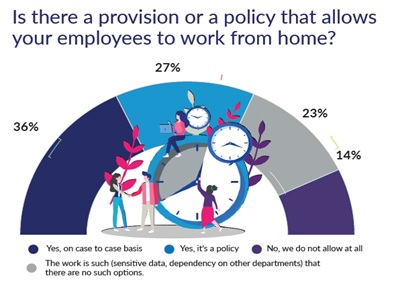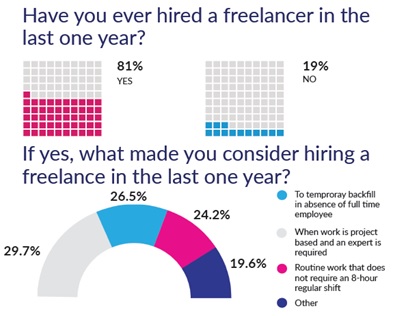
New Delhi, Delhi, India, 3rd October, 2019: Noble House, a leading HR talent marketplace, recently released a white paper on the evolving gig workforce, based on responses from about 150 business leaders and 300 HR professionals. The report titled The Gig Readiness Survey of Corporate India takes a deep dive into the world of work. It shares insights on how companies are seeing on-demand talent as a growth driver and how it is in sync with the changing expectations of a company’s most valuable resource – talent. Around 51% of employers opined as long as the work is being done, they are not concerned about the place from where the employees are working.
The report emphasizes on the correlation between flexibility and productivity validated by HR and business leaders. This has led them to recognize the potential benefits of the gig economy holistically. It details how, stepping into the future of work, it is important for organizations and HR leaders to recognize big benefits if they incorporate work flexibility into their strategy and operations.
The findings of the survey challenges some common presumptions-it reveals that 36% employers are providing ‘work from home’ as a policy in their companies. About 14% of the HR professionals surveyed revealed that more than 50% of employees opted for work from home when given the chance. This has helped in the adoption offlexible and remote ‘gigs’ within and outside the organization and developed employer-employee trust.
Speaking about this, Sumer Datta, Co-founder, Noble House Consulting Pte,said, “Our recent survey indicates a rising awareness about remote working and employers are trying to adopt well crafted flexible arrangements. Such an arrangement ensures that workers not only meet deadlines but also take ownership of their projects. In our survey, about 59% employers agreed that as long as work is being done, it is irrelevant whether it is in office or at home. In the last two years, more than 53% of employers have absorbed 5% to 20% of gig workers into their organization. This indicates that employers are finding value in working with gig workers and keen on adding them to their talent pool. The gig economy is thus changing three major dimensions of the nature of work: the work itself, who does it, and where it will be done.”

As per the survey, approximately 30% of employers depend on third-party agencies and consultancies for hiring gig workers. About 25% use online gig platforms like Fiverr, Naukri.com etc. which have mushroomed especially with the rise of the gig economy. The maximum demand (approx. 15%) is in the marketing and product and operations verticals due to the rise of digital marketing and less interdependency with other departments. This is followed by the IT/Tech department and HR at about 10%.
What is interesting is that employers want to be inclusive and extend certain benefits to the gig workers. Some of these include upskilling, coaching, and access to training materials.Along with trainings, employers believe that partial medical coverage and Sodexo must be offered to the gig employees.
The success of the gig economy ultimately lies in the hands of the business and HR ecosystem locally and internationally. The future workforce is all about flexibility and technology has made it a win-win proposition for the employers and employees in the system. Knowing what skills are in demand and how roles are evolving will help corporates and HR leaders prepare better for the future workforce.





